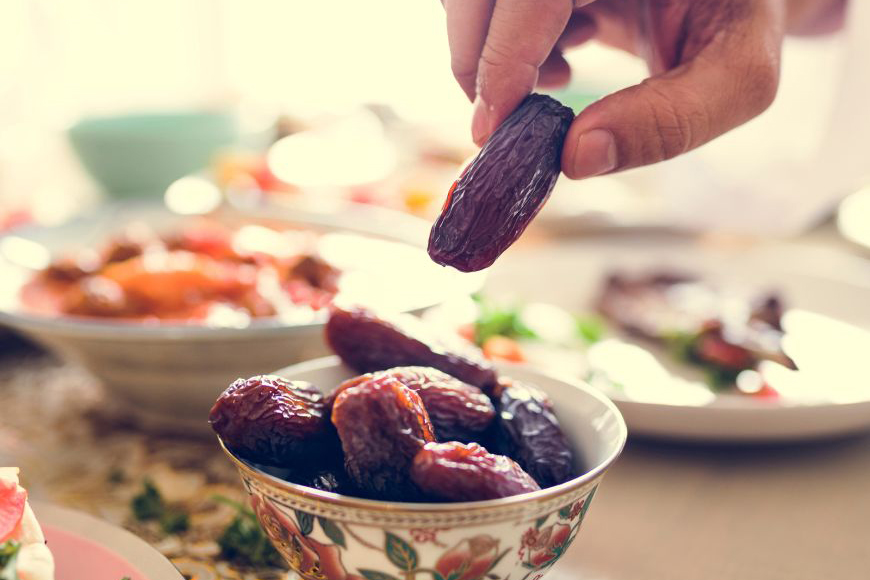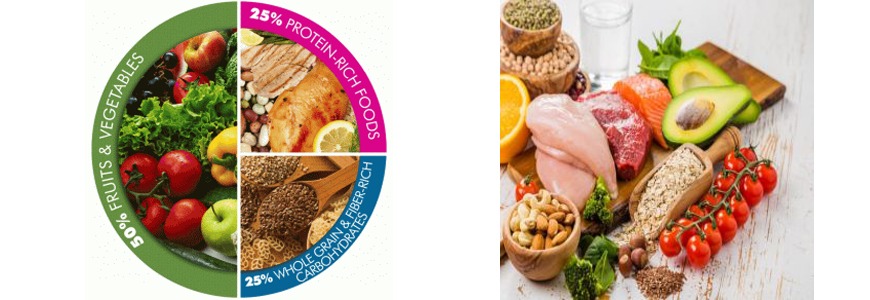Significance of Eating Right During the Holy Month of Ramadan
Experts Let's Cook shine light on why its important to eat right during the holy month
28 April 2019
Editor

Ramadan is the ninth month of the Islamic calendar and fasting during this holy month is one of the five pillars of the Islamic religion.
To fast, Muslims abstain from eating, drinking, smoking activities from Dusk to Dawn. Iftars mark the end of fasting at Dusk. When the sun goes down, families and friends typically gather around a table of lavish feasts. While iftars are an enjoyable experience, they can be daunting for people trying to maintain good eating habits during this holy month.
We at Let’s Cook Catering Services LLC. have put together a few tips to help you find a simpler way to break your fast and make your Ramadan a healthy one.

End your fast with dates
Traditionally, dates are eaten at the start of your iftar meal, because they give a nutritious burst of natural sugars and fuel your body with much needed energy. If you suffer from headaches during the fasting hours, the likely cause is low blood sugar. Begin your iftar with 2 dates and replenish your sugar levels
Hydrate enough before eating
Drink plenty of fluids such as water, freshly squeezed juice, milk, laban drinks or soups. This will prevent dehydration and provide your body with the essential fluids it needs. Water remains your best source of hydration and is key to flush out toxins that build up during the fasting period.
Drink 1 – 2 glass of water before your meal and not during your meal to avoid delaying your digestion process. Be wary of Ramadan drinks because they contain a lot of sugar and calories.
Soups are an indispensable dish during iftar. They’re rich in water and help you hydrate. Reach out for lentil, tomato, or vegetable soup and avoid cream-based soup. If you don’t enjoy a warm soup during the summer months, cold soups like cucumber & mint or melon & ginger make a great alternative.
No substitute for fresh fruits and vegetables
Vegetables & Fruits are rich in vitamins, minerals, and fiber and provide plenty of nutrients with minimal calories. The more colorful your salad, the more health benefits it holds. It also provides a feeling of fullness, ensuring you eat less on your main dish. They should ideally contribute to at least 50% of a meal serving.
Do not avoid but choose good carbs
Your iftar meal should contain a source of carbohydrates, preferably complex. These include brown rice, whole grain pasta or bread, potatoes or burghul. Complex carbs provide a more stable and sustainable source of energy in addition to fiber and minerals and should not exceed 25% of your meal serving. Fiber rich foods help regulate the digestive system and reduce stress on bowel movements. They also help in regulating blood sugar levels and controlling cholesterol buildup.
Choose lean proteins
At iftar, you should aim to eat quality lean proteins that are easily digestible and contain all the essential amino acids. Your body requires amino acids to repair tissues, build and maintain muscle mass and should be regulated to a maximum of 25 % of your meal serving.
Beef, milk, yogurt, eggs, cheese, fish and poultry are all complete high-quality proteins. Choose lean proteins to get the benefits with little saturated fats. Include fish, skinless chicken or turkey and low-fat dairy to have as part of your iftar meal. If you’re vegan, you can select other protein sources such as legumes, beans and nuts such as Soy Nuggets.
SEE ALSO: Recipes with Let's Cook: Pan Grilled Snapper, Papaya Salad & Rice Noodles
Say no to foods high in fat, salt and sugar
Ideally, stay away from foods which are difficult to digest for iftar that have too much unhealthy fats, salt and added sugar. When cooking, choose healthier cooking methods like stewing, baking, roasting, steaming or grilling and avoid frying.
Add aromatics, herbs and spices instead of commercial sauces and condiments to flavor your meals. Also wherever possible, replace sweets and sweetened drinks with natural and healthy options like fruits, dried fruits and fruit salads.
Having a balanced meal is very important in our daily life, it is even more important during Iftar and Suhoor as the meal replenishes energy reserves and helps sustain your fast the following day.
You must put an extra effort into consuming the right foods to get the nutrients your body requires by designing a menu of healthy recipes for each week. This way you will not forget any item on your purchase list. Ramadan is an opportunity to cultivate good eating habits that will stay with you after the fasting month ends.
We at Let’s Cook Catering services LLC. are committed and promote a healthy lifestyle by designing balanced and nutrition rich recipes, which can be availed through our Meal Kits on a weekly basis hassle free.
EW readers can also an exclusive 10% discount on all meal planning options on Let's Cook. To avail the discount, please use CODE EW10.
During the holy month of Ramadan, all our meal kit boxes will have a complimentary pack of dates. We wish all our followers and partners a Healthy Ramadan for 2019.
- Tags:
- let's cook
- uae dining
- ramadan 2019















